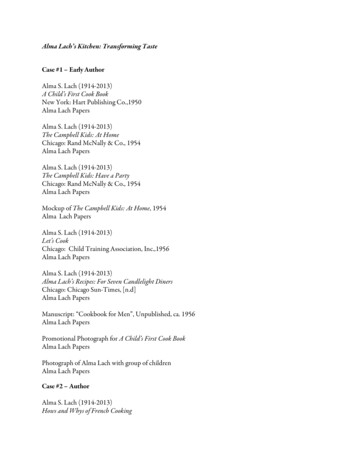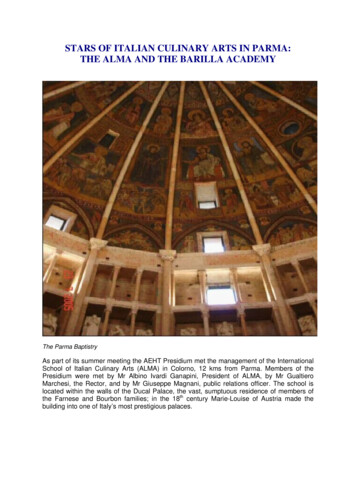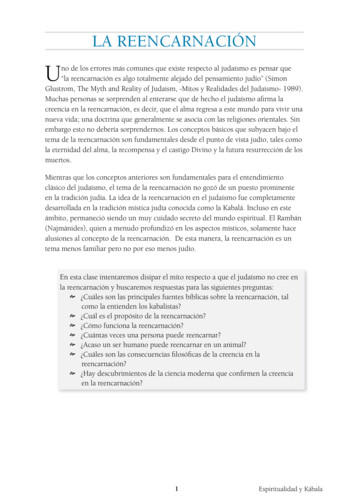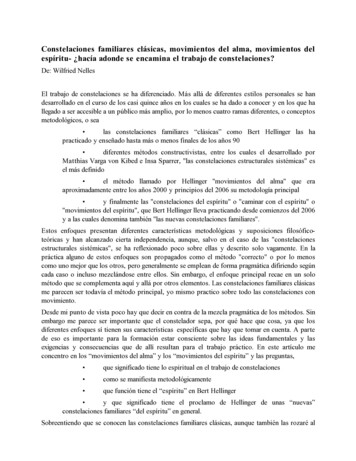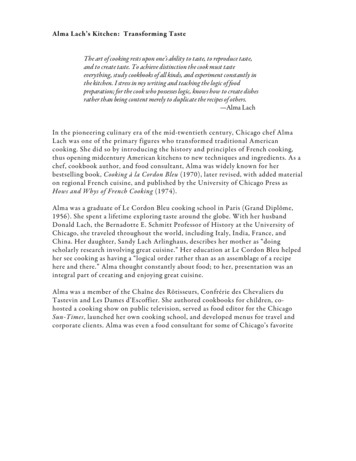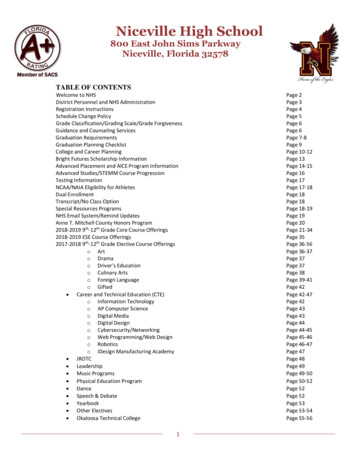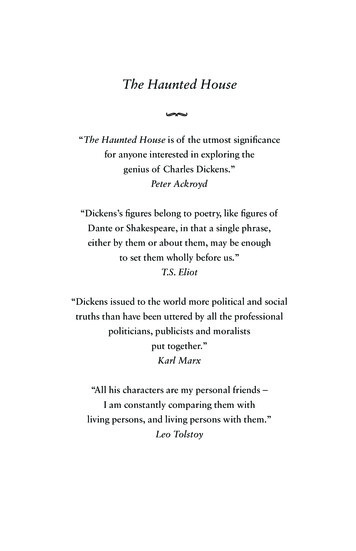
Transcription
The Haunted House“The Haunted House is of the utmost significancefor anyone interested in exploring thegenius of Charles Dickens.”Peter Ackroyd“Dickens’s figures belong to poetry, like figures ofDante or Shakespeare, in that a single phrase,either by them or about them, may be enoughto set them wholly before us.”T.S. Eliot“Dickens issued to the world more political and socialtruths than have been uttered by all the professionalpoliticians, publicists and moralistsput together.”Karl Marx“All his characters are my personal friends –I am constantly comparing them withliving persons, and living persons with them.”Leo Tolstoy
alma classics
The Haunted HouseCharles DickenswithHesba StrettonGeorge Augustus SalaAdelaide Anne ProcterWilkie CollinsElizabeth GaskellAL MA CL AS S I CS
alma classics ltdHogarth House32-34 Paradise RoadRichmondSurrey TW9 1SEUnited Kingdomwww.almaclassics.comThe Haunted House first published in 1862First published by Alma Classics Limited (previously Oneworld ClassicsLimited) in 2009. Reprinted 2011.This new edition first published by Alma Classics Ltd in 2015Front cover image Paul M. King PhotographyPrinted in Great Britain by CPI Group (UK) Ltd, Croydon CR0 4YYisbn:978-1-84749-433-7All rights reserved. No part of this publication may be reproduced, stored inor introduced into a retrieval system, or transmitted, in any form or by anymeans (electronic, mechanical, photocopying, recording or otherwise), withoutthe prior written permission of the publisher. This book is sold subject to thecondition that it shall not be resold, lent, hired out or otherwise circulatedwithout the express prior consent of the publisher.
ContentsThe Haunted HouseChapter 1: The Mortals in the Houseby Charles DickensChapter 2: The Ghost in the Clock Roomby Hesba StrettonChapter 3: The Ghost in the Double Roomby George Augustus SalaChapter 4: The Ghost in the Picture Roomby Adelaide Anne ProcterChapter 5: The Ghost in the Cupboard Roomby Wilkie CollinsChapter 6: The Ghost in Master B.’s Roomby Charles DickensChapter 7: The Ghost in the Garden Roomby Elizabeth GaskellChapter 8: The Ghost in the Corner Roomby Charles DickensNote on the TextNotesExtra MaterialCharles Dickens’s LifeCharles Dickens’s WorksSelect Bibliography13193347576979119121121123125134139
Charles Dickens (1812–70)
John Dickens,Charles’s fatherCatherine Dickens,Charles’s wifeElizabeth Dickens,Charles’s motherEllen Ternan
1 Mile End Terrace, Portsmouth, Dickens’s birthplace (above left),48 Doughty Street, London, Dickens’s home 1837–39 (above right)and Tavistock House, London, Dickens’s residence 1851–60 (below)
Gad’s Hill Place, Kent, where Dickens lived from 1857 to 1870 (above)and the author in his study at Gad’s Hill Place (below)
The Haunted House
1The Mortals in the Houseby Charles DickensUthe accredited ghostly circumstances, and environedby none of the conventional ghostly surroundings, did I first makeacquaintance with the house which is the subject of this Christmaspiece. I saw it in daylight, with the sun upon it. There was no wind, norain, no lightning, no thunder, no awful or unwonted circumstance ofany kind to heighten its effect. More than that, I had come to it directfrom a railway station – it was not more than a mile distant from therailway station – and, as I stood outside the house, looking back uponthe way I had come, I could see the goods train running smoothly alongthe embankment in the valley. I will not say that everything was utterlycommonplace, because I doubt if anything can be that, except to utterlycommonplace people – and there my vanity steps in, but I will take iton myself to say that anybody might see the house as I saw it, any fineautumn morning.The manner of my lighting on it was this.I was travelling towards London out of the north, intending to stop bythe way to look at the house. My health required a temporary residencein the country, and a friend of mine who knew that, and who hadhappened to drive past the house, had written to me to suggest it as alikely place. I had got into the train at midnight, and had fallen asleep,and had woke up and had sat looking out of the window at the brilliantNorthern Lights in the sky, and had fallen asleep again, and had wokeup again to find the night gone, with the usual discontented convictionon me that I hadn’t been to sleep at all – upon which question, in thefirst imbecility of that condition, I am ashamed to believe that I wouldhave done wager by battle with the man who sat opposite me. Thatopposite man had had, through the night – as that opposite man alwayshas – several legs too many, and all of them too long. In addition to thisunreasonable conduct (which was only to be expected of him), he hadnder none of3
the haunted househad a pencil and a pocketbook, and had been perpetually listening andtaking notes. It had appeared to me that these aggravating notes relatedto the jolts and bumps of the carriage, and I should have resigned myselfto his taking them, under a general supposition that he was in the civilengineering way of life, if he had not sat staring straight over my headwhenever he listened. He was a goggle-eyed gentleman of a perplexedaspect, and his demeanour became unbearable.It was a cold, dead morning (the sun not being up yet), and when Ihad out-watched the paling light of the fires of the iron country, and thecurtain of heavy smoke that hung at once between me and the stars andbetween me and the day, I turned to my fellow traveller and said:“I beg your pardon, sir, but do you observe anything particular inme?” For, really, he appeared to be taking down either my travelling capor my hair, with a minuteness that was a liberty.The goggle-eyed gentleman withdrew his eyes from behind me, as ifthe back of the carriage were a hundred miles off, and said, with a loftylook of compassion for my insignificance:“In you, sir? B.”“B, sir?” said I, growing warm.“I have nothing to do with you, sir,” returned the gentleman; “pray letme listen O.”He enunciated this vowel after a pause, and noted it down.At first I was alarmed, for an express lunatic and no communicationwith the guard is a serious position. The thought came to my relief thatthe gentleman might be what is popularly called a rapper: one of a sectfor (some of) whom I have the highest respect, but whom I don’t believein. I was going to ask him the question, when he took the bread out ofmy mouth.“You will excuse me,” said the gentleman contemptuously, “if I am toomuch in advance of common humanity to trouble myself at all about it.I have passed the night – as indeed I pass the whole of my time now – inspiritual intercourse.”“Oh!” said I, something snappishly.“The conference of the night began,” continued the gentleman, turningseveral leaves of his notebook, “with this message: ‘Evil communicationscorrupt good manners’.”“Sound,” said I, “but, absolutely new?”“New from spirits,” returned the gentleman.I could only repeat my rather snappish “Oh!” and ask if I might befavoured with the last communication?4
chapter 1: the mortals in the house by charles dickens“‘A bird in the hand,’” said the gentleman, reading his last entry withgreat solemnity, “‘is worth two in the Bosh.’”“Truly I am of the same opinion,” said I, “but shouldn’t it be Bush?”“It came to me, Bosh,” returned the gentleman.The gentleman then informed me that the spirit of Socrates haddelivered this special revelation in the course of the night. “My friend,I hope you are pretty well. There are two in this railway carriage. Howdo you do? There are 17,479 spirits here, but you cannot see them.Pythagoras is here. He is not at liberty to mention it, but hopes youlike travelling.” Galileo had likewise dropped in, with this scientificintelligence. “I am glad to see you, amico. Come sta? Water will freezewhen it is cold enough. Addio!” In the course of the night, also, thefollowing phenomena had occurred. Bishop Butler had insisted onspelling his name “Bubler”, for which offence against orthography andgood manners he had been dismissed as out of temper. John Milton(suspected of wilful mystification) had repudiated the authorship ofParadise Lost, and had introduced, as joint authors of that poem, twounknown gentlemen, respectively named Grungers and Scadgingtone.And Prince Arthur, nephew of King John of England, had describedhimself as tolerably comfortable in the seventh circle, where he waslearning to paint on velvet, under the direction of Mrs Trimmer andMary Queen of Scots.If this should meet the eye of the gentleman who favoured me withthese disclosures, I trust he will excuse me for confessing that the sightof the rising sun, and the contemplation of the magnificent order of thevast universe, made me impatient of them. In a word, I was so impatientof them, that I was mightily glad to get out at the next station, and toexchange these clouds and vapours for the free air of heaven.By that time it was a beautiful morning. As I walked away among suchleaves as had already fallen from the golden, brown and russet trees, andas I looked around me on the wonders of Creation, and thought of thesteady, unchanging and harmonious laws by which they are sustained,the gentleman’s spiritual intercourse seemed to me as poor a piece ofjourney-work as ever this world saw. In which heathen state of mind, Icame within view of the house, and stopped to examine it attentively.It was a solitary house, standing in a sadly neglected garden: a prettyeven square of some two acres. It was a house of about the time ofGeorge II; as stiff, as cold, as formal, and in as bad taste, as couldpossibly be desired by the most loyal admirer of the whole quartet ofGeorges. It was uninhabited, but had, within a year or two, been cheaply5
the haunted houserepaired to render it habitable; I say cheaply, because the work had beendone in a surface manner, and was already decaying as to the paintand plaster, though the colours were fresh. A lopsided board droopedover the garden wall, announcing that it was “to let on very reasonableterms, well furnished”. It was much too closely and heavily shadowedby trees, and, in particular, there were six tall poplars before the frontwindows, which were excessively melancholy, and the site of which hadbeen extremely ill chosen.It was easy to see that it was an avoided house – a house that wasshunned by the village, to which my eye was guided by a church spiresome half a mile off – a house that nobody would take. And the naturalinference was that it had the reputation of being a haunted house.No period within the four-and-twenty hours of day and night is sosolemn to me as the early morning. In the summertime, I often risevery early, and I am always on those occasions deeply impressed by thestillness and solitude around me. Besides that there is something awfulin the being surrounded by familiar faces asleep – in the knowledge thatthose who are dearest to us, and to whom we are dearest, are profoundlyunconscious of us, in an impassive state anticipative of that mysteriouscondition to which we are all tending – the stopped life, the brokenthreads of yesterday, the deserted seat, the closed book, the unfinishedbut abandoned occupation, all are images of death. The tranquillity ofthe hour is the tranquillity of death. The colour and the chill have thesame association. Even a certain air that familiar household objects takeupon them when they first emerge from the shadows of the night intothe morning, of being newer, and as they used to be long ago, has itscounterpart in the subsidence of the worn face of maturity or age, indeath, into the old youthful look. Moreover, I once saw the apparitionof my father at this hour. He was alive and well, and nothing ever cameof it, but I saw him in the daylight, sitting with his back towards me, ona seat that stood beside my bed. His head was resting on his hand, andwhether he was slumbering or grieving, I could not discern. Amazed tosee him there, I sat up, moved my position, leant out of bed and watchedhim. As he did not move, I spoke to him more than once. As he did notmove then, I became alarmed and laid my hand upon his shoulder, as Ithought – and there was no such thing.For all these reasons, and for others less easily and briefly stateable, Ifind the early morning to be my most ghostly time. Any house would bemore or less haunted, to me, in the early morning, and a haunted housecould scarcely address me to greater advantage than then.6
chapter 1: the mortals in the house by charles dickensI walked on into the village, with the desertion of this house upon mymind, and I found the landlord of the little inn sanding his doorstep. Ibespoke breakfast, and broached the subject of the house.“Is it haunted?” I asked.The landlord looked at me, shook his head and answered, “I saynothing.”“Then it is haunted?”“Well!” cried the landlord, in an outburst of frankness that had theappearance of desperation. “I wouldn’t sleep in it.”“Why not?”“If I wanted to have all the bells in a house ring, with nobody to ring’em, and all the doors in a house bang with nobody to bang ’em, andall sorts of feet treading about with no feet there, why then,” said thelandlord, “I’d sleep in that house.”“Is anything seen there?”The landlord looked at me again, and then, with his former appearanceof desperation, called down his stable-yard or “Ikey!”The call produced a high-shouldered young fellow, with a round redface, a short crop of sandy hair, a very broad humorous mouth, a turnedup nose and a great sleeved waistcoat of purple bars with mother-of-pearlbuttons, that seemed to be growing upon him, and to be in a fair way – ifit were not pruned – of covering his head and overrunning his boots.“This gentleman wants to know,” said the landlord, “if anything’sseen at The Poplars.”“’Ooded woman with a howl,” said Ikey, in a state of great freshness.“Do you mean a cry?”“I mean a bird, sir.”“A hooded woman with an owl. Dear me! Did you ever see her?”“I seen the howl.”“Never the woman?”“Not so plain as the howl, but they always keeps together.”“Has anybody ever seen the woman as plainly as the owl?”“Lord bless you, sir! Lots.”“Who?”“Lord bless you, sir! Lots.”“The general-dealer opposite, for instance, who is opening hisshop?”“Perkins? Bless you, Perkins wouldn’t go a-nigh the place. No!”observed the young man, with considerable feeling. “He an’t otherwise,an’t Perkins, but an’t such a fool as that.”7
the haunted house(Here, the landlord murmured his confidence in Perkins’s knowingbetter.)“Who is – or who was – the hooded woman with the owl? Do youknow?”“Well!” said Ikey, holding up his cap with one hand while he scratchedhis head with the other. “They say, in general, that she was murdered,and the howl he ’ooted the while.”This very concise summary of the facts was all I could learn, exceptthat a young man, as hearty and likely a young man as ever I see, had beentook with fits and held down in ’em, after seeing the hooded woman.Also, that a personage dimly described as “a hold chap, a sort of a oneeyed tramp, answering to the name of Joby, unless you challenged himas Greenwood, and then he said, ‘Why not? And even if so, mind yourown business,’” had encountered the hooded woman a matter of five orsix times. But I was not materially assisted by these witnesses; inasmuchas the first was in California, and the last was, as Ikey said (and he wasconfirmed by the landlord), “Anywheres”.Now, although I regard with a hushed and solemn fear the mysteriesbetween which and this state of existence is interposed the barrierof the great trial and change that fall on all the things that live, andalthough I have not the audacity to pretend that I know anything ofthem, I can no more reconcile the mere banging of doors, ringing ofbells, creaking of boards and suchlike insignificances, with all themajestic beauty and pervading analogy of all the divine rules that I ampermitted to understand, than I had been able, a little while before, toyoke the spiritual intercourse of my fellow traveller to the chariot of therising sun. Moreover, I had lived in two haunted houses – both abroad.In one of these, an old Italian palace, which bore the reputation ofbeing very badly haunted indeed, and which had recently been twiceabandoned on that account, I lived eight months, most tranquilly andpleasantly: notwithstanding that the house had a score of mysteriousbedrooms, which were never used, and possessed, in one large room inwhich I sat reading, times out of number at all hours, and next to whichI slept, a haunted chamber of the first pretensions. I gently hinted theseconsiderations to the landlord. And as to this particular house having abad name, I reasoned with him, why, how many things had bad namesundeservedly, and how easy it was to give bad names, and did he notthink that if he and I were persistently to whisper in the village thatany weird-looking old drunken tinker of the neighbourhood had soldhimself to the Devil, he would come in time to be suspected of that8
chapter 1: the mortals in the house by charles dickenscommercial venture! All this wise talk was perfectly ineffective withthe landlord, I am bound to confess, and was as dead a failure as everI made in my life.To cut this part of the story short, I was piqued about the hauntedhouse, and was already half resolved to take it. So, after breakfast, I gotthe keys from Perkins’s brother-in-law (a whip and harness maker, whokeeps the post office, and is under submission to a most rigorous wifeof the Doubly Seceding Little Emmanuel persuasion) and went up to thehouse, attended by my landlord and by Ikey.Within, I found it, as I had expected, transcendently dismal. Theslowly changing shadows, waved on it from the heavy trees, were dolefulin the last degree; the house was ill-placed, ill-built, ill-planned and illfitted. It was damp, it was not free from dry rot, there was a flavour ofrats in it, and it was the gloomy victim of that indescribable decay whichsettles on all the work of man’s hands whenever it is not turned to man’saccount. The kitchens and offices were too large and too remote fromeach other. Above stairs and below, waste tracks of passage intervenedbetween patches of fertility represented by rooms, and there was amouldy old well with a green growth upon it, hiding, like a murderoustrap, near the bottom of the back stairs, under the double row of bells.One of these bells was labelled, on a black ground in faded white letters,Master B. This, they told me, was the bell that rang most.“Who was Master B.?” I asked. “Is it known what he did while theowl hooted?”“Rang the bell,” said Ikey.I was rather struck by the prompt dexterity with which this youngman pitched his fur cap at the bell, and rang it himself. It was a loud,unpleasant bell, and made a very disagreeable sound. The other bellswere inscribed, according to the names of the rooms to which their wireswere conducted, as “Picture Room”, “Double Room”, “Clock Room”and the like. Following Master B.’s bell to its source, I found that younggentleman to have had but indifferent third-class accommodation ina triangular cabin under the cock-loft, with a corner fireplace whichMaster B. must have been exceedingly small if he were ever able towarm himself at, and a corner chimney piece like a pyramidal staircaseto the ceiling for Tom Thumb. The papering of one side of the roomhad dropped down bodily, with fragments of plaster adhering to it, andalmost blocked up the door. It appeared that Master B., in his spiritualcondition, always made a point of pulling the paper down. Neither thelandlord nor Ikey could suggest why he made such a fool of himself.9
the haunted houseExcept that the house had an immensely large rambling loft at top, Imade no other discoveries. It was modestly well furnished, but sparely.Some of the furniture – say, a third – was as old as the house; the rest wasof various periods within the last half century. I was referred to a cornchandler in the marketplace of the country town to treat for the house.I went that day, and I took it for six months.It was just the middle of October when I moved in with my maidensister (I venture to call her eight-and-thirty, she is so very, very handsome,sensible and engaging). We took with us a deaf stable-man, my blood hound Turk, two woman servants and a young person called an OddGirl. I have reason to record of the attendant last enumerated, who wasone of Saint Lawrence’s Union Female Orphans, that she was a fatalmistake and a disastrous engagement.The year was dying early, the leaves were falling fast, it was a raw coldday when we took possession, and the gloom of the house was mostdepressing. The cook (an amiable woman, but of a weak turn of intellect)burst into tears on beholding the kitchen, and requested that her silverwatch might be delivered over to her sister (2 Tuppintock’s Gardens,Ligg’s Walk, Clapham Rise), in the event of anything happening to herfrom the damp. Streaker, the housemaid, feigned cheerfulness, but wasthe greater martyr. The Odd Girl, who had never been in the country,alone was pleased, and made arrangements for sowing an acorn in thegarden outside the scullery window, and rearing an oak.We went, before dark, through all the natural – as opposed to super natural – miseries incidental to our state. Dispiriting reports ascended(like the smoke) from the basement in volumes, and descended from theupper rooms. There was no rolling pin, there was no salamander (whichfailed to surprise me, for I don’t know what it is), there was nothing inthe house; what there was, was broken, the last people must have livedlike pigs, what could the meaning of the landlord be? Through thesedistresses, the Odd Girl was cheerful and exemplary. But within fourhours after dark we had got into a supernatural groove, and the OddGirl had seen “Eyes”, and was in hysterics.My sister and I had agreed to keep the haunting strictly to ourselves,and my impression was, and still is, that I had not left Ikey, when hehelped to unload the cart, alone with the women, or any one of them,for one minute. Nevertheless, as I say, the Odd Girl had “seen Eyes” (noother explanation could ever be drawn from her) before nine, and byten o’clock had had as much vinegar applied to her as would pickle ahandsome salmon.10
chapter 1: the mortals in the house by charles dickensI leave a discerning public to judge of my feelings, when, under theseuntoward circumstances, at about half-past ten o’clock Master B.’s bellbegan to ring in a most infuriated manner, and Turk howled until thehouse resounded with his lamentations!I hope I may never again be in a state of mind so unchristian as themental frame in which I lived for some weeks, respecting the memory ofMaster B. Whether his bell was rung by rats, or mice, or bats, or wind, orwhat other accidental vibration, or sometimes by one cause, sometimesanother and sometimes by collusion, I don’t know, but certain it is thatit did ring, two nights out of three, until I conceived the happy idea oftwisting Master B.’s neck – in other words, breaking his bell short off– and silencing that young gentleman, as to my experience and belief,for ever.But by that time, the Odd Girl had developed such improving powersof catalepsy that she had become a shining example of that veryinconvenient disorder. She would stiffen like a Guy Fawkes endowed withunreason, on the most irrelevant occasions. I would address the servantsin a lucid manner, pointing out to them that I had painted Master B.’sroom and balked the paper, and taken Master B.’s bell away and balkedthe ringing, and if they could suppose that that confounded boy hadlived and died, to clothe himself with no better behaviour than wouldmost unquestionably have brought him and the sharpest particles of abirch broom into close acquaintance in the present imperfect state ofexistence, could they also suppose a mere poor human being, such as Iwas, capable by those contemptible means of counteracting and limitingthe powers of the disembodied spirits of the dead, or of any spirits? I sayI would become emphatic and cogent, not to say rather complacent, insuch an address, when it would all go for nothing by reason of the OddGirl’s suddenly stiffening from the toes upwards, and glaring among uslike a parochial petrifaction.Streaker, the housemaid, too, had an attribute of a most discomfitingnature. I am unable to say whether she was of an unusually lymphatictemperament, or what else was the matter with her, but this young womanbecame a mere distillery for the production of the largest and mosttransparent tears I ever met with. Combined with these characteristicswas a peculiar tenacity of hold in those specimens, so that they didn’tfall, but hung upon her face and nose. In this condition, and mildly anddeploringly shaking her head, her silence would throw me more heavilythan the Admirable Crichton* could have done in a verbal disputationfor a purse of money. Cook, likewise, always covered me with confusion11
the haunted houseas with a garment, by neatly winding up the session with the protest thatthe ’ouse was wearing her out, and by meekly repeating her last wishesregarding her silver watch.As to our nightly life, the contagion of suspicion and fear was amongus, and there is no such contagion under the sky. Hooded woman?According to the accounts, we were in a perfect convent of hoodedwomen. Noises? With that contagion downstairs, I myself have sat in thedismal parlour, listening, until I have heard so many and such strangenoises, that they would have chilled my blood if I had not warmed it bydashing out to make discoveries. Try this in bed, in the dead of night; trythis at your own comfortable fireside, in the life of the night. You can fillany house with noises, if you will, until you have a noise for every nervein your nervous system.I repeat: the contagion of suspicion and fear was among us, and thereis no such contagion under the sky. The women (their noses in a chronicstate of excoriation from smelling salts), were always primed and loadedfor a swoon, and ready to go off with hair-triggers. The two elderdetached the Odd Girl on all expeditions that were considered doublyhazardous, and she always established the reputation of such adventuresby coming back cataleptic. If Cook or Streaker went overhead afterdark, we knew we should presently hear a bump on the ceiling, and thistook place so constantly that it was as if a fighting man were engagedto go about the house, administering a touch of his art which I believe iscalled The Auctioneer to every domestic he met with.It was in vain to do anything. It was in vain to be frightened, for themoment in one’s own person, by a real owl, and then to show the owl.It was in vain to discover, by striking an accidental discord on the piano,that Turk always howled at particular notes and combinations. It wasin vain to be a Rhadamanthus* with the bells, and if an unfortunatebell rang without leave, to have it down inexorably and silence it. It wasin vain to fire up chimneys, let torches down the well, charge furiouslyinto suspected rooms and recesses. We changed servants, and it was nobetter. The new set ran away, and a third set came, and it was no better.At last, our comfortable housekeeping got to be so disorganised andwretched that I one night dejectedly said to my sister:“Patty, I begin to despair of our getting people to go on with us here,and I think we must give this up.”My sister, who is a woman of immense spirit, replied, “No, John,don’t give it up. Don’t be beaten, John. There is another way.”“And what is that?” said I.12
chapter 1: the mortals in the house by charles dickens“John,” returned my sister, “if we are not to be driven out of thishouse, and that for no reason whatever that is apparent to you or me,we must help ourselves and take the house wholly and solely into ourown hands.”“But the servants ” said I.“Have no servants,” said my sister boldly.Like most people in my grade of life, I had never thought of thepossibility of going on without those faithful obstructions. The notionwas so new to me when suggested that I looked very doubtful.“We know they come here to be frightened and infect one another, andwe know they are frightened and do infect one another,” said my sister.“With the exception of Bottles,” I observed, in a meditative tone.(The deaf stableman. I kept him in my service, and still keep him, as aphenomenon of moroseness not to be matched in England.)“To be sure, John,” assented my sister, “except Bottles. And what doesthat go to prove? Bottles talks to nobody, and hears nobody unless heis absolutely roared at, and what alarm has Bottles ever given or taken!None.”This was perfectly true; the individual in question having retired,every night at ten o’clock, to his bed over the coach house, with noother company than a pitchfork and a pail of water. That the pail ofwater would have been over me, and the pitchfork through me, if I hadput myself without announcement in Bottles’s way after that minute, Ihad deposited in my own mind as a fact worth remembering. Neitherhad Bottles ever taken the least notice of any of our many uproars.An imperturbable and speechless man, he had sat at his supper, withStreaker present in a swoon, and the Odd Girl marble, and had only putanother potato in his cheek, or profited by the general misery to helphimself to beefsteak pie.“And so,” continued my sister, “I exempt Bottles. And considering,John, that the house is too large, and perhaps too lonely, to be kept wellin hand by Bottles, you and me, I propose that we cast among our friendsfor a certain selected number of the most reliable and willing, form asociety here for three months, wait upon ourselves and one another, livecheerfully and socially and see what happens.”I was so charmed with my sister that I embraced her on the spot, andwent into the plan with th
It was easy to see that it was an avoided house – a house that was shunned by the village, to which my eye was guided by a church spire some half a mile off – a house that nobody would take. And the natural inference was that it had the reputation of being a haunted house. No perio

